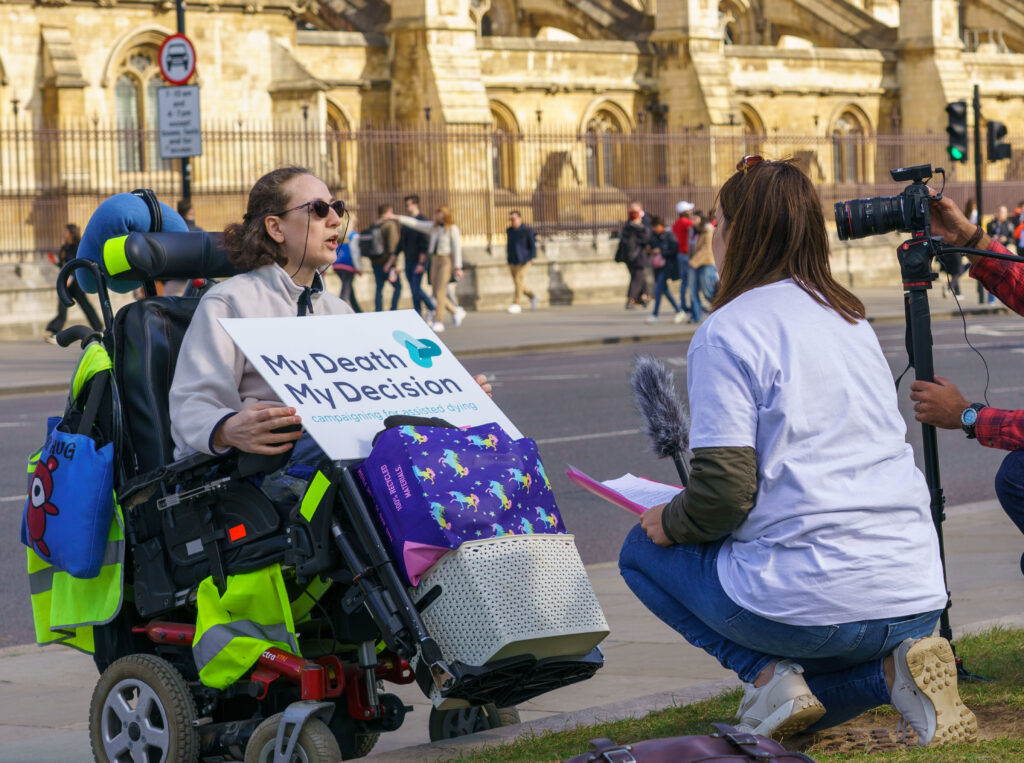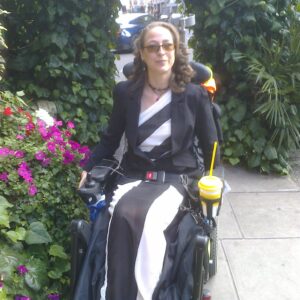
A new BBC documentary by Liz Carr, provocatively titled ‘Better Off Dead?’, has highlighted the views of disabled people within the assisted dying debate.
This article aims to promote the views of disabled people we work closely with, as well as highlight key research around this debate, which is often overlooked or misrepresented.
Our patron, Jean Eveleigh, responds to the debate:

“Liz Carr is an esteemed actress and a disability campaigner but she is not the sole voice of the disabled community. In her upcoming documentary on the subject of assisted dying she states that “the disabled community is terrified”; However I am a member of the disabled community and I very much want the legal right to be assisted to end my life when my quantity of life dramatically exceeds the quality I have.
Assisted dying has to be made legal to allow people like me to assert their legal right in the same way non-disabled people can. As a disabled person requesting an assisted death, you are asking someone to aid you in completing a decision you have taken about your life. I have made a decision about my personal health and well-being that I am unable to act on my own and need someone to help me to complete the action.
To this end, I find this debate and the law it produces vital to the quality of life I currently have. My right to die with assistance will not force anyone else to make the same choice, but their right to live without assisted dying is forcing me to do the same, forcing me to live in pain and distress – this is inhumane and cruel.”

John Knight, My Death, My Decision’s disability advisor, said:
“The slogan “nothing about us without us” is blatantly at odds with the views of around 80% of disabled people in the UK who approve of assisted dying. This contradictory position baffles me”.
My Death, My Decision’s policy on assisted dying is:
We believe that any adult of sound mind who is intolerably suffering from an incurable, physical condition and has a clear and settled wish to die should have the option of an assisted death.
To be crystal clear, under the kind of law we campaign for, having a disability would not make a person eligible to have an assisted death. They would have to be intolerably suffering from their condition and have come to a clear and settled wish to receive help to die.
It would remain illegal to encourage anyone, including disabled people, to request assisted dying.
Here is some key research that supports the views we have set out.
Disabled people do not oppose assisted dying:
A survey of 140 disability rights organisations in the UK indicated that only 4% explicitly oppose assisted dying laws. A substantial majority either remain silent (84%) or explicitly endorse neutrality (4%) on assisted dying.
The position of Disability Rights UK is:
“This is a complex issue on which people hold different, passionately held views. Disability Rights UK respects those different views.”
88% of people who identify as disabled favour changing the law on assisted dying in at least some circumstances.
We have international evidence that assisted dying safeguards work:
One study of Oregon and the Netherlands found no evidence of heightened risk for people with disabilities and non-terminal conditions, and ‘no current factual support for so-called slippery-slope concerns’.
Another study from Belgium found no disproportionate impact on people with disabilities, nor a special increase in requests made or granted to people with disabilities.
Over ten studies have explored this question, looking at data from all jurisdictions where assisted dying is legal. None have found evidence of harm, disproportionate impact, or a slippery slope in protection.
No correlation between disability and uptake of assisted dying.
A 2015 study in the Netherlands, where assisted dying is legal for people who are suffering but not terminally ill, found no correlation between disability and uptake of assisted dying. A study looking at over twenty years of data from Oregon, came to the same conclusion.
Giving choice, a voice and autonomy to people who are suffering.
Assisted dying legislation gives everyone additional rights. It gives people who are suffering and will never recover the right to exercise autonomy over their own life and death. Denying this right using the veil of disability rights impacts on the free choice that someone like Jean Eveleigh wishes to have available, if the time comes when her suffering is too great.
Trevor Moore, Chair of My Death, My Decision, said:
‘We must of course hear the voices of assisted dying opponents, but conversely, we cannot allow hypothetical concerns to be a disproportionate distraction from the lived reality of countless people whose suffering is protracted while we await a compassionate law. Knowing that they could control the manner and timing of their own death, if and when they so choose, will in itself be of real comfort.
In the discussion of assisted dying it is crucial that we base decisions on evidence. Regrettably, there are opponents of a law who not only purport to speak for all disabled people, but also paint alarming pictures of assisted dying that are simply not borne out by the evidence from countless places that allow it.’
Notes:
Members of the MDMD team, as well as individuals affected by the current law on assisted dying, are available for interview upon request
For further comment or information, media should contact Nathan Stilwell at nathan.stilwell@mydeath-mydecision.org.uk or phone 07456200033.
Media can use the following press images, as long as they are attributed to “My Death, My Decision”.
My Death, My Decision is a grassroots campaign group that wants the law in England and Wales to allow mentally competent adults who are terminally ill or intolerably suffering from an incurable condition the option of a legal, safe, and compassionate assisted death. With the support of over 3,000 members and supporters, we advocate for an evidence-based law that would balance individual choice alongside robust safeguards and finally give the people of England and Wales choice at the end of their lives.

